Clare’s Gokhale Method® Success Story
In January and February this year I took the Gokhale Method Elements course, which consists of 18 brief (13 minute) but potent lessons. I would like to share my experience of the Gokhale Method with you in this blog post.
My goals were to find out how to sit, stand, and walk well, so that I don’t overstress the scoliotic parts of my back. I was also in search of more comfortable and beneficial sleeping positions. I felt I needed guidance to help me develop a better sense of my body posture and alignment. To be able to do a one-on-one course online made this possible for me.
It was only when I saw the difference between my “Before” and “After” pictures that I realized just how much change it was possible to make to my posture in such a relatively short period.
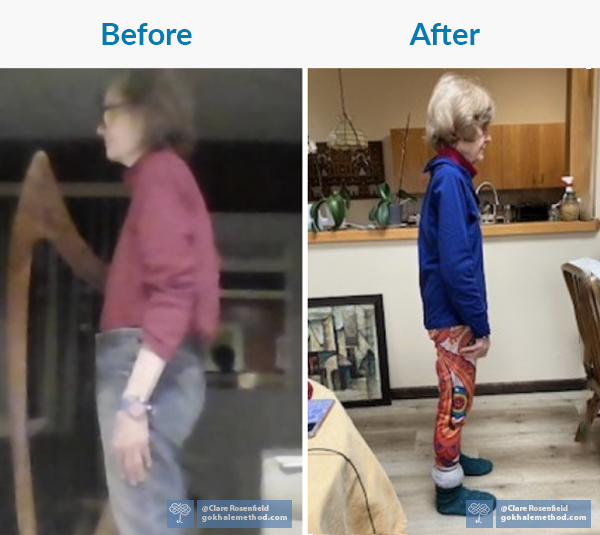
Learning to stand well has been transformational for me. You can see that I used to park my hips forward and sway back, pressuring on my lower spine and sending my neck forward—little wonder I was in so much pain. Though still a work in progress, I know how to align my weight better throughout my whole body.
I have always enjoyed exercise, movement, and body work, including hiking, Qigong, and yoga. I now have a healthy standing point from which to do all these activities.
When walking, for the first few steps I might omit to squeeze my glutes and check through the other things I know to do…but it is becoming more habitual so my muscle memory soon kicks in. Or I recall my favorite prompt of Esther’s, “if your glutes snooze, you lose.”
The J-spine concept was entirely new to me. I had tucked my pelvis under (as you saw in the above “Before” photo) all my life as far as I can recall. Consequently, I believe, the place that hurts for me is around L5-S1 at the very bottom of my spine, so I have to be accurate to squeeze my glutes from a relaxed pelvic position and not to sway and compress my lower back trying to make it happen with the wrong muscles. A single follow-up lesson on this was really useful to help me relax my pelvis back even more.
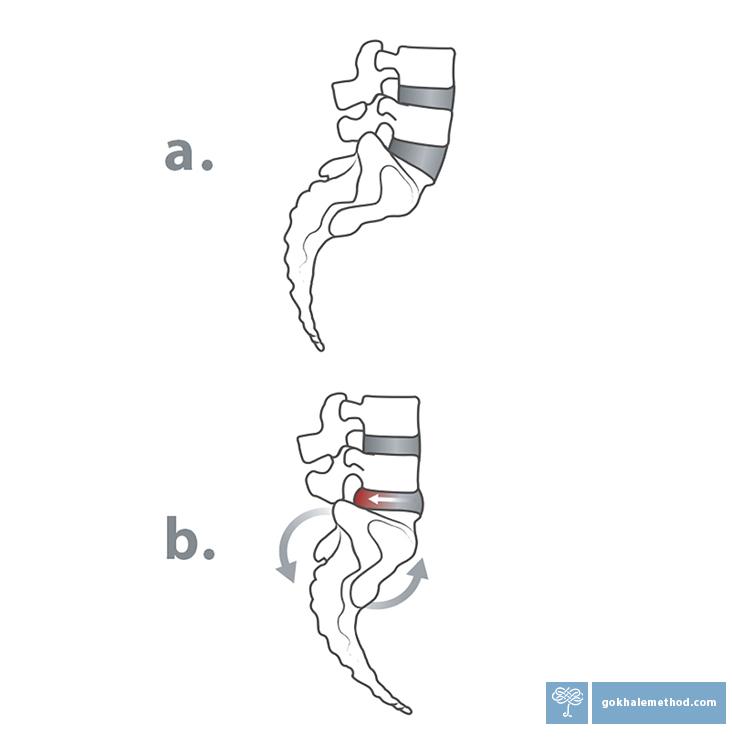
A healthy L5-S1 angle (J-spine) permits the wedge-space disc there the space that it needs (a.). Learning the Gokhale Method finally enabled me to stop tucking my pelvis and sacrum, and damaging my L5-S1 disc (b.).
Due to my scoliosis I have to be extra careful about how I do things, and with poor bending form, I would always ache—or have a more acute disaster. Now I understand why. I use the hip-hinging technique as I’ve been taught (plus putting my hands on my hips) and I can bend comfortably—it amazes me! I don’t straighten my legs like some of the pictures we see, as I don’t have the hamstring length, but I can follow the principles involved.
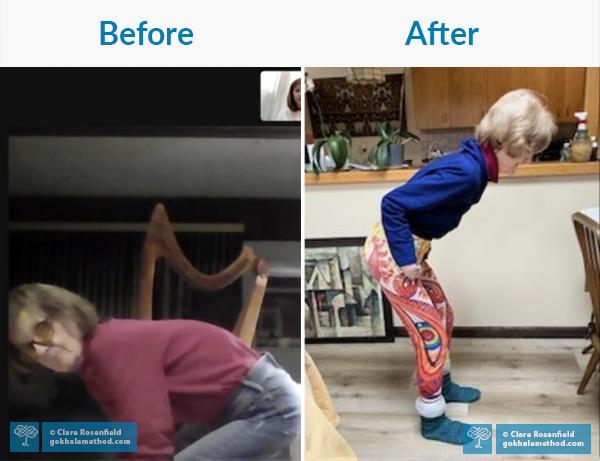
Since learning to hip-hinge I can bend without distorting my back and without pain. There are many principles to learn that contribute to healthy bending, which comes later in the course, but it has been well worth it.
Since 2005 I have been playing the harp, for which being in the right position is important. I pull the harp towards me more now, and when I bend, I bend at the hips, not rounding my back. When sitting with a backrest I have found using the Stretchsit® Cushion makes a good deal of difference to my comfort—I have one in the car, and in fact I’m sitting with one in this interview right now to reduce the pressure on my lower back.
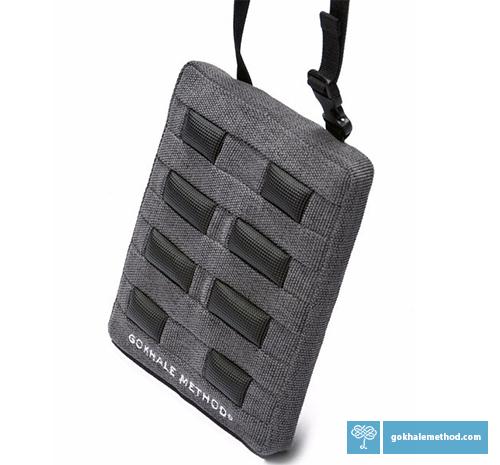
The gentle traction you can get in your lumbar area by using a Stretchsit® Cushion reduces compression and asymmetry in your spine.
Since a hysterectomy in 1995, I have lost bone density and three inches in height. I am working nightly with stretchlying to lengthen my spine and reduce my scoliosis. I am confident that stretchlying at night and using my inner corset to support my spine during the day will prevent any further height loss and increase in my scoliosis, as I have already seen such improvement in my posture. These two measures may well enable me to regain some of the height in my spine that I have lost.
In October I had an eye surgery, a partial cornea transplant, and to make sure that it stayed in place, for three days following the operation I had to keep my head still and remain on my back. I practiced stretchlying carefully leading up to the operation and found I could lie there all night comfortably; stretchlying is the best!
Come morning I have the option of switching to stretchlying on my side, which I also learned in the course. Again, I found a follow-up lesson on stretchlying on the side helpful as it involves a little more technical precision, especially with anteverting the pelvis, to work its magic.
For me the biggest help for my upper body was learning the shoulder roll…and I feel like my neck automatically gets into the right place after I’ve positioned my shoulders well. It also positions me better in sitting and standing, and helps me do more of the things I care deeply about.
One of those things is artwork, and I am now much more aware of my body while I’m doing it. For example, I’m standing straighter, and if I start to slouch—oops—I can feel it.
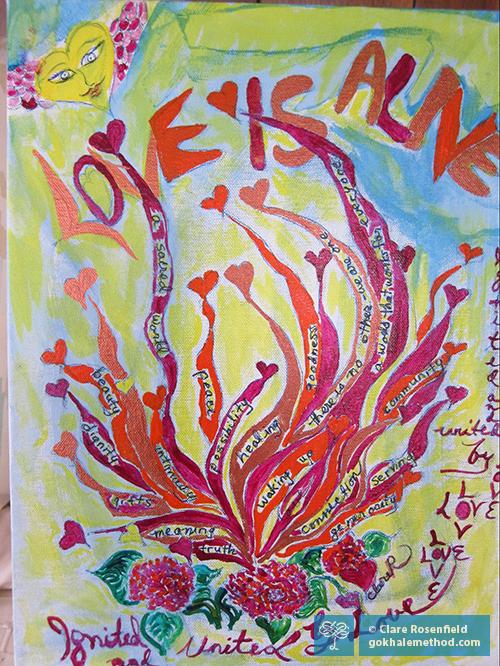
I love the poetry of combining imagery and words in my artwork.
I’m also at the computer writing books, including a biography, children’s books, and poetry. As I spend a good deal of time sitting, it’s important to do it well.
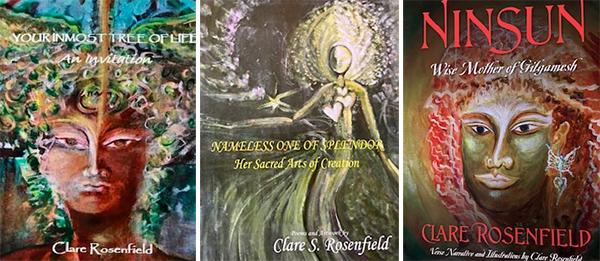
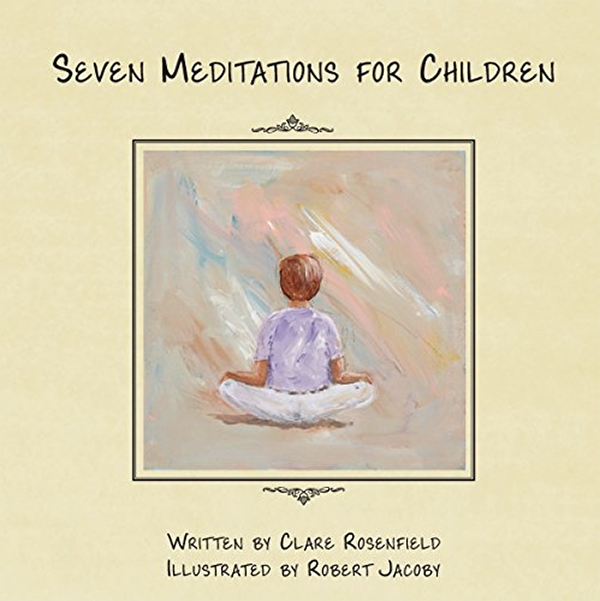
These are four of the numerous books I've published. I have illustrated the three books shown along the top here. Seven Meditations for Children I have recorded as an audiobook—see how the child is sitting with a nice straight back!
My husband had an eminent career in public health which took us all over the world. Rather than take a lucrative post as an Obstetrics and Gynecology trained MD, he chose instead to work for the poor and underserved of the world, becoming Founder-Director of the Center for Population and Family Health, 1975–86. He was then Dean of the Mailman School of Public Health at Columbia University, 1986–2008, and honored while alive with the naming of the Allan Rosenfield Building and after his passing by the Tribute Wall I fundraised for. The first year of our marriage was spent in Nigeria, and we were in Thailand for six years. I must have seen a lot of examples of elegant posture in the rural areas of those countries, but back then I didn’t recognize how important it was.
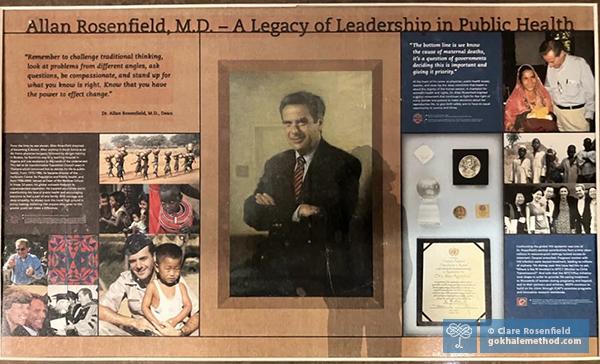
Here is a photo of the Tribute Wall to my husband—there we are together, bottom left. My husband served in Korea as an Air Force doctor. You can see people headloading in Nigeria (left hand panel, photo top right).
I have six grandchildren, three boys and three girls, aged 12–23. When I’m with them I try to help them with their posture—they spend so much time hunched over. I guess it’s hard for children to envisage they are statistically likely to have back pain down the line, but at least I can sow the seeds for them to think about posture, and set as healthy an example as I can. I’m so glad that the Gokhale Method is there to help all generations—and especially the young—to rediscover their healthy posture heritage.
I’m known to my grandchildren as “the Nana who raps instead of naps!” Here is a rap I would like to share with you:
IT'S TIME WE VOW TO SPEAK RIGHT NOW
It's time we vow to speak right now
our vow to share a peace we dare
to live and keep and not let sleep
In mere intentions while old conventions
Toot horns of war. No more, no more,
We shout out loud, no more to shroud
Our depths of heart. It's time to start,
Yes, twenty-four seven, on Earth bring Heaven,
So one, two, three, it's you and me
To take a dive in what's alive,
Our YES to fate before too late
To emanate our LOVE not wait,
to one and all, the world enthrall
So they will see that all we be
One family! Yes all we be
One FAMILY!
Best next action steps for newcomers
If you would like insight on your posture, consider scheduling an Initial Consultation, online, or in person.
You can sign up below to join one of our upcoming FREE Online Workshops. . .

Comments
You sprinkled sprunki a bit…
You sprinkled sprunki a bit of wisdom into my day, and now I feel equipped to tackle any challenge that comes my way
Without any tricks, level…
Without any tricks, level devil 2 is a fun little game. Eighty amazing levels of enjoyment. graphics with almost a dozen hues that are well created.
The playful soundtrack in…
The playful soundtrack in Doodle Baseball adds a cheerful vibe to the whole experience.
Clare's transformation…
Clare's transformation through the Gokhale Method® is truly inspiring! The way this approach restores natural posture and alleviates pain resonates deeply with my own journey toward mindful movement. It's fascinating how small adjustments can lead to such profound changes in wellbeing.
On a different but equally therapeutic note, I've found Sprunki Mod to be an unexpectedly great way to unwind after posture exercises. The glitchy beats and cyberpunk vibe create this perfect flow state - you might enjoy experimenting with it here: [https://sprunki-mods.net/. Sometimes the best recovery comes from blending movement with creative expression!"
What a beautiful tribute to…
What a beautiful tribute to your husband's incredible work! It's so inspiring to see how you've carried forward the mission of promoting healthy habits, especially through posture awareness with your grandchildren. In a world where many are glued to devices, sharing such wisdom can truly make a difference. While you're at it, have you checked out the fun and engaging way to stay active with the game Snow Rider 3D? It’s a blast for all ages! Snow Rider 3D adds a playful twist to movement and could spark interest in fitness.
Add New Comment
Login to add commment
Login